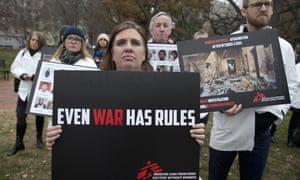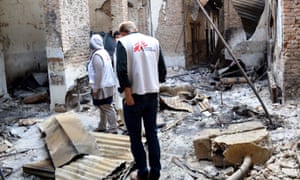Link
Attacks against civilians in war zones across the world have grown more indiscriminate due to a myopic focus by the major global powers on fighting terrorism, the head of the international charity Médecins Sans Frontières has said.
In an interview with the Guardian, Joanne Liu, the Canadian physician and president of MSF, issued a broad indictment of how modern warfare is conducted, declaring that world powers have failed in their duty to uphold the rules of conflict, threatening a return to “barbarian times”.
“We are in a completely different way of rules of engagement in conflicts,” she said during a visit to Beirut. “I still believe that what the Geneva convention and international humanitarian law brought to conflict was to mitigate war on civilians, and by not respecting that we are going backwards a hundred years. It’s barbarian times. I don’t think in the 21st century we should allow ourselves to drift there.
“If the rules are to be changed, we want to be told,” she said.

The past few months have seen an increased ferocity of attacks on health facilities, especially in the Middle East.
Last month, airstrikes hit an MSF supported hospital in Syria’s opposition-controlled Idlib province, killing 11 people, the 14th attack on medical facilities since the start of the year. A total of 94 airstrikes and shelling attacks targeted facilities backed by the organisation in Syria in 2015 alone.
Over the past five months, two MSF hospitals have been attacked in Yemen, as well as one mobile clinic and an ambulance belonging to the organisation, which is operating in the midst of a war where a coalition led by Saudi Arabia is fighting Iranian-backed Houthi rebels.
Last October, an MSF hospital in Afghanistan’s Kunduz district was destroyed after an hour of sustained airstrikes by the United States, despite repeated calls by the charity to the American-led coalition and the fact its GPS coordinates had been provided in advance.
“I think the last [attack in Syria] and the event in Kunduz, what is striking is the precision of the attack, the insistence of the attack and the persistence of the attack over time,” she said.
MSF has continued to insist on an independent investigation into the Kunduz strikes – Liu said it was obvious the attack was very precise, since even trees around the hospital compound were completely intact, whereas much of the hospital itself was burned to the ground.
She said she suspected that the attack was because the hospital was operating in territory recently conquered by the Taliban and had been treating war-wounded on both sides of the conflict as well as civilians.
“The unspoken thing, the elephant in the room, is the war against terrorism, it’s tainting everything,” she said. “People have real difficulty, saying: ‘Oh, you were treating Taliban in your hospital in Kunduz?’ I said we have been treating everyone who is injured, and it will have been Afghan special forces, it will have been the Taliban, yes we are treating everybody.”
She added: “People have difficulty coming around to it. It’s the core, stripped-down-medical-ethics duty as a physician. If I’m at the frontline and refuse to treat a patient, it’s considered a crime. As a physician this is my oath, I’m going to treat everyone regardless.”
The organisation’s latest public relations campaign has used the slogan “the doctor of your enemy is not your enemy”.
Liu said the lack of respect for the rules of war was a consequence of the involvement of members of the UN’s security council in conflicts around the world, as well as the counter-terrorism lens through which wars were being viewed.
“Today in Afghanistan, Yemen or Syria we have four out of five permanent members of the security council that are involved in the coalition,” she said. “They have a job to preserve peace in the world. I might be naive to say that but they’re supposed to preserve something, and today they are part of and taking active roles in those conflicts.
“For Syria they passed five days ago the last resolution on cessation of violence, they passed four before that, and they never implemented it,” she added. “How can they implement this when they themselves have vested interests in the conflict?”
The increasingly indiscriminate attacks on hospitals in Syria, paired with the declaration by Bashar al-Assad’s regime early on in the conflict that facilities operating in opposition territories were considered illegal and thus a legitimate target, has prompted local hospital directors to refuse to share GPS coordinates of their facilities, a decision MSF made public last month.
“The overarching attitude that we’ve had so far is that we are sharing the GPS coordinates, but when we support health facilities or hospitals, then the medical director is the one taking the final decision,” Liu said. “We gave them our advice, and maybe it was wrong because in reality it’s not that sharing our GPS coordinates prevented Kunduz from happening, and all the different attacks we had on Yemen.
“The Saudis told us when we gave them our GPS coordinates, they just said: ‘OK, it doesn’t mean that you will have protection,’” she added.
Liu said that attacks on civilians and global crises would endure as long as the international community viewed them from a national security standpoint.
“If we continue to respond to crises through the sole lens of national security interests, we will continue to see hospitals being bombed, to see people washed up on our beaches,” she said.
But she urged a halt to attacks on hospitals in conflict zones.
“Everybody who’s been in a hospital or had a loved one in a hospital, we all relate to the idea that if you’re in a hospital in the lowest point of vulnerability, the last thing you expect is to get a bomb on your head,” she said. “When you are fighting for your life and trying to pull yourself through, or your grandmother is trying to pull through a triple bypass, the last thing you want is a bomb on your head.”
She added: “And I think that everybody, in Beirut, in Montreal, in Homs or Madaya, thinks the same thing, I think everybody believes that. That’s our common humanity.”



No comments:
Post a Comment